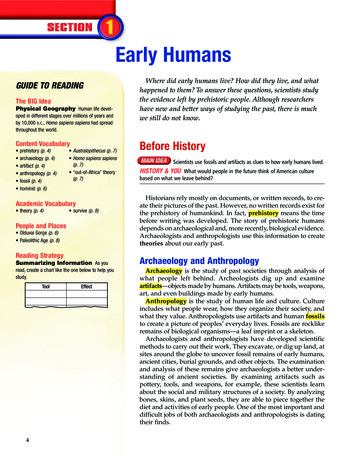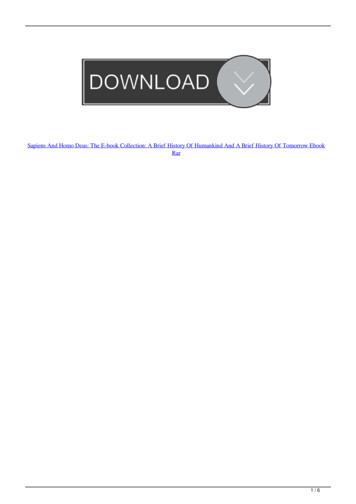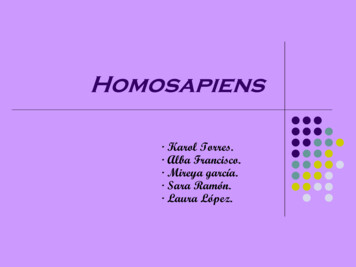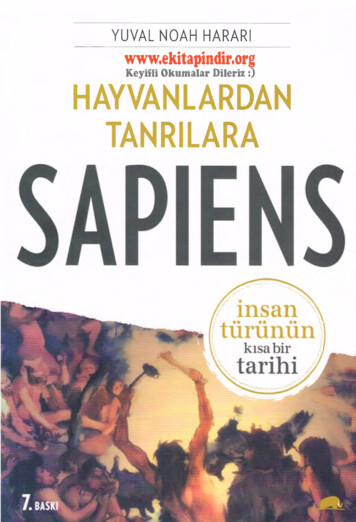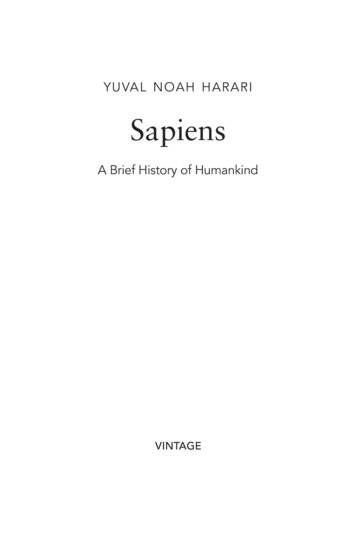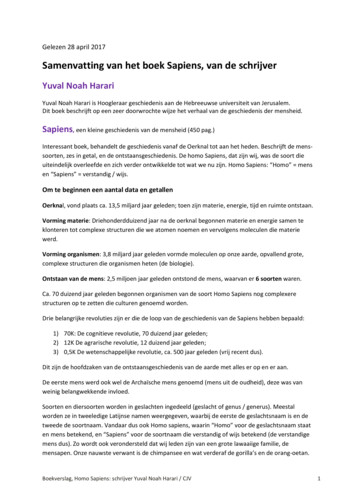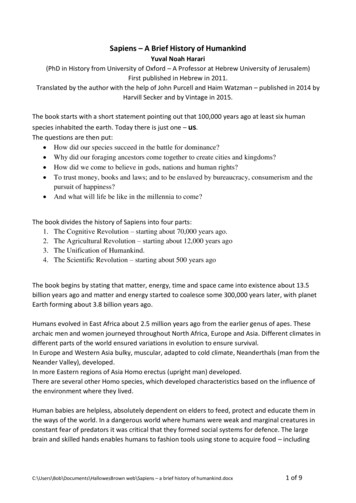
Transcription
Sapiens – A Brief History of HumankindYuval Noah Harari(PhD in History from University of Oxford – A Professor at Hebrew University of Jerusalem)First published in Hebrew in 2011.Translated by the author with the help of John Purcell and Haim Watzman – published in 2014 byHarvill Secker and by Vintage in 2015.The book starts with a short statement pointing out that 100,000 years ago at least six humanspecies inhabited the earth. Today there is just one – us.The questions are then put: How did our species succeed in the battle for dominance? Why did our foraging ancestors come together to create cities and kingdoms? How did we come to believe in gods, nations and human rights? To trust money, books and laws; and to be enslaved by bureaucracy, consumerism and thepursuit of happiness? And what will life be like in the millennia to come?The book divides the history of Sapiens into four parts:1. The Cognitive Revolution – starting about 70,000 years ago.2. The Agricultural Revolution – starting about 12,000 years ago3. The Unification of Humankind.4. The Scientific Revolution – starting about 500 years agoThe book begins by stating that matter, energy, time and space came into existence about 13.5billion years ago and matter and energy started to coalesce some 300,000 years later, with planetEarth forming about 3.8 billion years ago.Humans evolved in East Africa about 2.5 million years ago from the earlier genus of apes. Thesearchaic men and women journeyed throughout North Africa, Europe and Asia. Different climates indifferent parts of the world ensured variations in evolution to ensure survival.In Europe and Western Asia bulky, muscular, adapted to cold climate, Neanderthals (man from theNeander Valley), developed.In more Eastern regions of Asia Homo erectus (upright man) developed.There are several other Homo species, which developed characteristics based on the influence ofthe environment where they lived.Human babies are helpless, absolutely dependent on elders to feed, protect and educate them inthe ways of the world. In a dangerous world where humans were weak and marginal creatures inconstant fear of predators it was critical that they formed social systems for defence. The largebrain and skilled hands enables humans to fashion tools using stone to acquire food – includingC:\Users\Bob\Documents\HallowesBrown web\Sapiens – a brief history of humankind.docx1 of 9
splitting bone to extract marrow from a carcass that larger animals may have killed and eaten mostof the flesh.For millions of years the genius Homo’s position in the food chain was solidly in the middle, huntingsmaller creatures and gathering what they could. It is only in the last 100,000 years that humansjumped to the top of the food chain. The former top of the food chain predators (Lions etc.)evolved slowly; the sudden rise of humankind has not given the ecosystem time to adjust.Fire was domesticated perhaps as early as 800,000 years ago. By about 300,000 years ago Homoerectus, Neanderthals and Homo sapiens were using fire on a daily basis for cooking, adjustingbushland and fighting off larger animals. Having some control of fire was a major step forward.Despite having fire, 150,000 years ago humans were perhaps no more than 1 million living betweenthe Indonesian archipelago and the Iberian Peninsula, with Homo sapiens a small group in EastAfrica.The Cognitive RevolutionAbout 70,000 years ago they started to migrate into Arabia and Eurasia with perhaps someinterbreeding. The book mentions the remarkable achievement of Sapiens reaching Australia about45,000 years ago (research since the book was written suggest this might be more like 65,000 yearsago – RHB).Sapiens achieved unprecedented accomplishments in the period 70,000 to 30,000 years ago –works of art, boats, oil lamps, bows and arrows, needles for sewing. This is sometimes called TheCognitive Revolution – possibly a change in the inner wiring of the brain resulting in much improvedcommunication by sophisticated language. Social skills were greatly enhanced and the ability togossip and make up stories appeared to grow with the rise legends, myths, gods and religions.The imaginative brain permitted Sapiens to collectively share an image of things that didn’t reallyexist. This enabled larger groups to cooperate with a shared belief in the concept of a particularnation, a god or even in the modern concept of a company – Harari quotes the case of Peugeot,which was founded by a real person Jean Peugeot as a wagon manufacture in the 13th century, butis now a legal fiction called a “limited liability company”. We are collectively willing to see it as alegal fiction bound by laws of the countries in which it operates, even though it has no physicalpresence.The book notes that a company is established by the simple ritual of signing a wonderfullydecorated pieces of paper; a hocus-pocus similar to a Catholic priest turning bread and wine intoGod’s flesh and blood by assiduously observing established procedures believed by many Catholics.Telling convincing stories is not easy, but it has been achieved and millions of people are convincedto believe particular stories about gods, nations or limited liability companies. The network ofstories becomes incredibly powerful.C:\Users\Bob\Documents\HallowesBrown web\Sapiens – a brief history of humankind.docx2 of 9
The immense diversity of imagined reality that Sapiens invented and the resulting diversebehaviours are the main components of what we call ‘cultures’. The unstoppable development andalterations of cultures are what we call ‘history’.The cognitive Revolution marks the point where history took over from biology in shaping Homosapiens development. Biology sets the behaviour parameters, but sapiens have astounding abilitiesto invent fiction and play games, thus developing each generation further than the last.It is suggested that for many thousands of years Homo sapiens lived in small bands scatteredaround the world and their life consisted of foraging for food – mushrooms, roots, fruit, worms,frogs and small animals – and also spending much of each day in storytelling, making both usefuland artistic articles, dancing, singing and learning how to live in their environment. It was a time fordeveloping myths and mystical beliefs with occasional fights between rival bands.During the Cognitive Revolution many tools and devices were developed, including boats suitablefor travel over oceans so that Australia was settled some 45,000 years ago (more recent researchsuggests 60,000 to 65,000). It also seems clear that humans reshaped the environment in manyways, including driving many large animal species to extinction.The Agricultural RevolutionAround 9500 – 8500 BC people in the Middle East noticed that spreading wheat seeds increased theyield and so they could stay for progressively longer periods in one place – starting the AgriculturalRevolution. The book points out that this revolution did not make a better life for our ancestors.The hunter gatherers had spent their life in stimulating and varied ways and were less in dangerstarvation and disease. The extra food resulting from agriculture, increased population and farmershad to work physically harder and longer hours. On top of that, closer living and less varied dietincreased illness. There is also some evidence of increased fighting over food resources.In effect the agricultural Revolution was a luxury trap that transformed the world in ways nobodyenvisaged or wanted. Prior to agricultural practices people had engaged in many activities. Onefascinating structure is the GÖBEKLI TEPE that was excavated in south-east Turkey in 1995. It is amonumental, deliberately carved, pillared stone structure (some stones 5 metres high and weighing7 tonnes) dated to about 9500 BC – well before Stonehenge dated to 2500 BCE. It is not known whythis was constructed, but it probably has some religious basis.As humans spread around the world so did their domesticated animals, with a massive increase inthe population of selected species of chickens, cattle, pigs and sheep. Unfortunately these animalsbecame the most miserable creatures that ever lived, as the domestication was founded on a seriesof brutal practices that only became crueller with the passage of the centuries. Animals had shorterlifespans and their freedom was severely constrained.C:\Users\Bob\Documents\HallowesBrown web\Sapiens – a brief history of humankind.docx3 of 9
Farming brought stresses on people worrying about future droughts and floods. Unfortunately forhard-working peasants, rulers and elites sprang-up, living off their surplus food and leaving themwith, at best, subsistence. The forfeited food surpluses fuelled politics, wars, art and philosophy.They built palaces, forts, monuments and temples. Until the late modern era more than 90% ofhumans were peasants.In due course, smaller groupings of people formed together into larger entities, with wealth fed bythe farmers, and led by a small group ruling, sometimes despotically, and forming large armies tocontrol their borders – Rome being a classic example.It is perhaps surprising, but true, that myths sustained these large empires. The book considers twoclassic myths of history: Hammurabi of c.1776 BC in ancient Babylon and the American declarationof Independence of AD 1776, which today still serves as a cooperation manual for hundreds ofmillions of Americans.Hammurabi, a powerful king of Babylonia aimed to set up a just uniform legal system and produceda large code of conduct, which was followed for many years – long after his death. The text beginsby mentioning the leading deities of the time and claims they had appointed Hammurabi to makejustice prevail in the land. Amongst other things the document sets out punishments for certaincrimes. These punishments vary greatly depending on whether the crime is against a ‘superior man’or ‘a commoner’. The code clearly considers that people have different status.About 3500 years after Hammurabi’s death the inhabitants of 13 British colonies in North Americadeclared themselves no longer subject to the British Crown and wrote a document based on theAmerican God – somewhat different to the gods of Babylon. Amongst other things the Americandeclaration claims all men are created equal, endowed by their Creator to have certain inalienablerights including life, liberty and the pursuit of happiness.The book “Sapiens” points out that people have not been created, but have evolved; people arebiologically different, liberty is meaningless and happiness can’t be objectively measured. It is alsopointed out that many of those who signed the American declaration of Independence wereslaveholders and they saw no hypocrisy in regarding Blacks, American Indians and women as lessertypes than men. It also consecrated a hierarchy between rich and poor.To sustain human rights, Christianity, democracy and capitalism it is essential that a large majorityof people believe in these imagined orders. You never admit that the order is imagined. You alwaysinsist that it is an objective reality created by the great gods or by the laws of nature. You alsoeducate people thoroughly. From the moment they are born constantly remind them of theprinciples of the imagined order.At the rules and regulations for controlling an empire grew it became essential to recordinformation. The Sumerians between 3,500 and 3,000 BC developed an effective system of writingon clay tablets; starting initially with numbers for keeping records of traded goods.C:\Users\Bob\Documents\HallowesBrown web\Sapiens – a brief history of humankind.docx4 of 9
The inequality between races and sexes is discussed in the book. It is claimed that in 1865 whites,as well as many Blacks, took it to be a simple matter of fact that Blacks were less intelligent moreviolent and sexually desolate, lazier and less concerned about personal cleanliness than whites.In many societies women were simply the property of men; for example a daughter is consideredthe property of her father – in the Bible (Deuteronomy 22:28 – 9) it is stated that if a man seizesand lies with a virgin who is not betrothed, he shall give the father of the young woman 50 shekelsof silver and she shall forthwith be his wife. Raping a woman who did not belong to any man wasnot considered a crime at all.Human beliefs and cultures have been in constant flux. Christianity converted millions of people,but it had inbuilt contradictions between chivalry and brutality as was highlighted in the behaviourof knights in the Crusades. There is also the ongoing conflict in contemporary American politicsbetween wanting an equitable society and also wanting to have high individual incomes. Thesecontradictions can be the engines for creativity and dynamism in our species. Discord in ourthoughts, ideas and values tells us to re-evaluate and criticise current practices.Over the last few centuries there have been important global unifications in the sense that empireshave grown, foods and eating habits have become similar around the world, the major religions,such as Hinduism, Christianity and Islam have become more universal, while commercialcorporations have merged across continents.Hunter gatherers had no money, but from early agricultural times bartering by exchange of actualgoods became common. Then various objects, barley, seashells etc., came into use asrepresentation of goods or a service. The rise of larger cities saw the development of coins madefrom metals that were in short supply – silver and gold. Trust in the value of these coins dependedon trust in the stability of the empire producing them. Thus Roman coins became widely acceptedin many parts of the world – even as far away as India. Belief in the value of money does notrequire belief in the culture.Nation-states grew from a belief in the structure and power of the ruling entity to maintain orderwithin the defined borders. As we move into the 21 st century Harari points out a move towardsrecognition of humanity itself as a total combined entity, with the potential for a global empirerather than individual nations. (However this book was written in 2011. Since that time majorevents in USA, UK, China Russia and some smaller states suggest global cooperation is still a longway off; e.g. ‘America First’ and Britex – RHB).Harari posits religion as a system of human norms and values that is founded on the belief in asuperhuman order. Based on the superhuman order, religions established norms and values. Manyearly religions were essentially local with local gods and had no intention to spread their beliefs toother groups. Current well-known religions such as Christianity, Islam and Buddhism considerthemselves universal and they became missionary, with the plan to convert the world.C:\Users\Bob\Documents\HallowesBrown web\Sapiens – a brief history of humankind.docx5 of 9
There have been many polytheist religions dating from hunter gatherer days. Following theagricultural Revolution several groups endorsed the idea of one single god – for example: Judaism,Christianity and Islam. The monotheists have some difficulty in explaining why a God who is said tobe good can allow bad things to happen. Christians came up with the idea of a Satan – a dualism inwhich powerful evil forces can exist. More recently emphasis is placed on God giving people freewill so that they are free to do bad things.The last 300 years has seen a decline in theist religions with a rise in new natural-law religions orideologies, such as liberalism, communism, capitalism, nationalism, and Nazism. These establish asystem of human norms and values, just as theist religions do, but based on a concept or a personthat is superhuman rather than supernatural.The Scientific RevolutionIn the year 1500, there were about 500 million Homo sapiens in the entire world. Today, there areover 7 million. The past 500 years have witnessed phenomenal and unprecedented growth inhuman power and capacity for production, associated with some 115-fold increase in energyconsumption.Humans have sought to understand the universe at least since the Cognitive Revolution, butmodern science differs from all previous traditions in three critical ways:a. Willingness to admit ignorance.b. The centrality of observation and mathematics.c. The acquisition of new powers and technologies.Isaac Newton’s publication of ‘The Mathematical Principles of Natural Philosophy’ (1687) is perhapsthe most important book in modern history with its ability to explain and predict the movement ofall bodies in the universe based on three simple laws of motion. In the past 200 years the morecomplex aspects of reality have been analysed by a new branch of mathematics: statistics.The nation-states recognised the importance of science beyond its purely “curiosity driven”motivation and scientific and technological research has been increasingly funded by nations andcorporations. This became very clear in the technological developments during the Second WorldWar with many developments, including the German introduction of rocket propulsion and UScreation of the nuclear bomb; both of which have had major ongoing influences on human society.The rise of the scientific approach and the acceptance of current ignorance were the major factorsthat permitted the then minor region, Europe, to become the dominant force colonising the wholeworld. This has now reached the point where Western culture is dominant in almost all countries ofthe globe. Nearly all of this colonisation was achieved with brutal repression of existing people andtheir cultures.C:\Users\Bob\Documents\HallowesBrown web\Sapiens – a brief history of humankind.docx6 of 9
The book states that modern economic history can be understood by the single word, ‘growth’. Themodern economy captures everything it can find and grows spectacularly. A simple example isgiven of a building contractor, Mr Stone, who receives 1 million from a past job and deposits thisin a newly established Greedy Bank so the bank now has 1 million capital. Then a pastry cook, Mrs.McDoughnut, asks for a loan of 1 million from the Greedy Bank to build a bakery and this isgranted by the bank. She hires Mr Stone to do this building job and pays him 1 million, which hedeposits in his account at Greedy Bank. So his account at the bank is now 2 million, even thoughthe actual amount in the bank’s vault is only 1 million. It doesn’t stop there. Mrs. McDoughnutcould keep borrowing money from the bank and having additions built on her premises by MrStone. Under the current US banking law this can continue until Mr Stone has 10 million shown inhis account, even though there is actually still only 1 million in the Greedy Bank vault.The above story may seem incredible, but it is the basis of modern economy. It is a tribute tohuman imagination and represents trust in the future. Greedy Bank trusts that Mrs. McDoughnutwill make great profits from her baking and payoff her loan with interest. In ancient times credit likethis had not been introduced. People did not see the future as continually growing. Now credit isseen as the difference between today’s money pie and tomorrow’s bigger money pie. Thisapproach has allowed entrepreneurs to develop the modern world.An assumption behind the acceptance of growth is that everyone will benefit – the rich using theirprofits to open new factories and hire new Employees. The new religions of capitalism and freeenterprise developed. Amongst other things capitalism has a profound effect on science. To keepthe wheels of growth turning there is a need for new discoveries and new development.Governments and corporations are willing to provide funds for scientific research, even basicresearch, because they know it will lead to new devices and expand growth.The modern capitalist economy must constantly increase production and hence somebody mustbuy the products or industrialists and investors alike will go bust. Throughout past historical timesthe watchword was frugality. In the modern era consumption has become the improved ethic.Consumerism has used psychology to convince people that indulgence is good for you.Manufacturers deliberately design short-term goods and invent new and unnecessary models tocontinue a purchasing cycle.The Industrial Revolution has completely transformed our once green and blue planet into aconcrete and plastic shopping centre with tens of thousands of railways, roads and skyscrapingmetropolises for the convenience of over 7 billion Homo sapiens and a huge decline in otheranimals. The book quotes a reference, which estimates the combined mass of all humans as about300 million tons, domesticated farmyard animals about 700 million tons, whilst that of survivinglarge wild animals (from porcupines to elephants and whales) as less than 100 million tons.Up until two centuries ago everyone depended on the family and local community. There were nopolicemen, no social workers and no compulsory education. Over the last two centuries theIndustrial Revolution has given the market immense new powers, provided the state with newC:\Users\Bob\Documents\HallowesBrown web\Sapiens – a brief history of humankind.docx7 of 9
means of communication and transportation and placed at the government’s disposal an army ofclerks, teachers, policemen and social workers. The state weakened traditional family bonds;encouraging people to become individuals with the state providing people with work, insuranceand a pension. While this new arrangement gave all people (men women and children) moreindividual freedom it came at a cost – the state controlled people to operate within the establishedrules.Consumerism and nationalism are both imagined constructs of the state. The state works hard tomake people in a particular nation believe that they are all similar to everyone in the rest of thenation and that they should get excited at the sight of their national symbols.The rise of the nation state has reduced the threat of violence to a very low level. Quoting statisticsfor the year 2002 the book shows that globally, more people (873,000) died by committing suicidethan by human violence (war and crime – 741,000).The immense improvement in material conditions over the last two centuries has been offset bythe collapse in family and the local community. Studies have shown that the average person maywell be no happier than a person living in 1800. Even the freedom we value so highly may beworking against us – with families breaking up and people living individually in an increasinglylonely world of unravelling communities and families.Happiness is very subjective; depending on the person’s existing condition and changes that mayoccur or be about to happen. Furthermore, biologists suggest that there are inherent happinesslevels genetically set in any particular individual. So that some people may be essentially happyeven in unpleasant circumstances, while others may be dismal even though conditions seem veryfavourable.Huxley’s view of the world is that happiness equals pleasure – bodily sensations limited by ourbiochemistry. Others note that things involving brief moments of joy and long periods of drudgerycan still be a great source of happiness – such as bringing up a child, even though this involveschanging of nappies, washing dishes and dealing with temper tantrums. Another finding is theconsideration of one’s life in its entirety; if this is seen as meaningful and worthwhile, there is alasting feeling of happiness.From a scientific point of view, human life has absolutely no meaning. Humans are the outcome ofblind evolutionary processes that operate without goal or purpose. If planet Earth were to blow uptomorrow morning, the universe would probably keep going about its business as usual. Hence anymeaning that people ascribed to their lives is just a delusion. However, people can find greatpurpose in increasing human knowledge, defending your homeland, building a new company ormany other activities, which may themselves be delusional, but do bring happiness.The development of many religions was based on concepts that gave purpose to life; including inmany cases the idea of some superhuman entity that can be served by humans. Buddha did notC:\Users\Bob\Documents\HallowesBrown web\Sapiens – a brief history of humankind.docx8 of 9
invoke a deity, but he proposed that happiness could be sought not only by pursuit of externalachievements, but also the pursuit of inner feelings. In essence the key to happiness is to know thetruth about yourself – to understand who or what you really are. Most people wrongly identifythemselves with their feelings, thoughts, likes and dislikes. They never realise that the relentlesspursuit of particular feelings just traps them in misery.The end of Homo sapiens?By the beginning of the 21st-century humans have reached the stage where they can re-engineertheir own species. For many centuries they have interfered with natural selection in their breedingof domestic creatures – for example selectively breeding slow fat chooks has been undertaken toimprove diet. Castrating bullocks to increase their weight and reduce their aggression is longstanding and at one time boys with a good soprano voice were castrated to retain their singingability. Now humans have discovered methods for direct manipulate of genes to develop desiredcharacteristics.As well as genetic manipulation, the potential to create cyborgs is now within human hands. Bionicears have direct electro connections within the brain. Similar connections have been used to enablepeople who have lost limbs to communicate directly with computers driving artificial arms or legs.The possibility of implanting chips within the brain to provide direct communication or massivememory stores is seen as a potential reality.The future may well see the development of an entirely new species, initially designed by Homosapiens, but capable of further development in its own right as a super species able to focus andremember 1000 times greater than humans and never angry or sad. This new species may wellregard Homo sapiens as of little importance.The vital question that needs to be considered now is what do we want the future to become? Thereality is that we can’t stop scientists, nor can we be certain how things will go – predictions of thefuture have frequently been entirely wrong – however it is critical that, as a species, we recogniseour new massive powers and try to develop desirable future goals.Currently we are self-made gods with only the laws of physics to keep us company and we arewreaking havoc on our fellow animals and surrounding ecosystem; seeking more for our owncomfort and amusement, yet never finding satisfaction.Is there anything more dangerous than dissatisfied and irresponsible gods who don’t know whatthey want?C:\Users\Bob\Documents\HallowesBrown web\Sapiens – a brief history of humankind.docx9 of 9
C:\Users\Bob\Documents\HallowesBrown web\Sapiens - a brief history of humankind.docx 3 of 9 The immense diversity of imagined reality that Sapiens invented and the resulting diverse behaviours are the main components of what we call 'cultures'. The unstoppable development and alterations of cultures are what we call 'history'.
